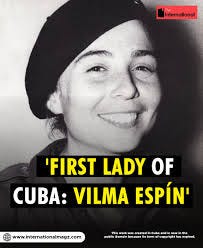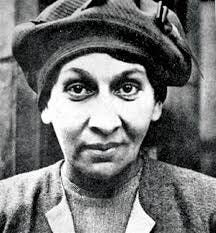Vilma Espín’s remarkable address given in 1961 at the Latin-American Conference for National Sovereignty, Economic Emancipation and Peace, where she invokes the hope for a renewed consciousness to emerge out of the Americas, rooted in independence and peace.
"The Revolution based itself on the exploited masses of the countryside and the city. It was and will always be a revolution of the poor, by the poor and for the poor. It was born among youth and students, workers and professionals of the city, and grew strong in the Sierra, having taken root in the people of the land, who form the majority of the exploited in underdeveloped countries."
Vilma Espín (1930-2007) was a leading figure in the Cuban feminist movement who played a pivotal role in shaping the political landscape of Cuba and the Cuban Revolution.
In the 1950s, Espín participated in the opposition movement against the corrupt regime of Cuban dictator Fulgencio Batista and joined the 26th of July Movement, led by Fidel Castro. Following the success of the Cuban Revolution in 1959, Espín continued her advocacy for women's rights and spearheaded numerous initiatives to promote women's empowerment. In 1960, she co-founded the Federation of Cuban Women (FMC), an organization that advances the economic, social, and political participation of Cuban women.
The Internationalist is publishing the full transcript of Espin's 1961 speech, On our feet and not on our knees.
Even Marxist feminists like Claudia Jones in the 1940s and many others today argue that Black women face a triple or interlocking oppression they argue, structure the exploitation of workers by elucidating how neither the induction to work nor the surplus value created by all workers is the same. In doing so, they specify why capitalist exploitation is more intensive and brutal for workers of colour. Through the structural and historical framework of racial capitalism, it is determined that capital accumulation depends on this global racialised division of labour and who would eventually be disproportionately impacted, (Claudia Jones, An End to the Neglect of the Problems of the Negro Woman! (New York: National Women’s Commission CPUSA, 1949; other FEMALE Marxist writers; Jean Alt Belkhir; Intan Suwandi of Indonesia, and Kerala's K.R. Gouri Amma ); and to read Towards an Ecosocialist Feminism; Indian Women on an Arduous Road to Equality; Women Hold Up More Than Half the Sky.
Not forgetting our Malaysian female resistance fighters Shamsiah Fakeh
Read the past issues of
Journal #14; Journal #6
with embedded references to linked contents:
Journal #12
Journal #8
Journal #4
Journal 5






